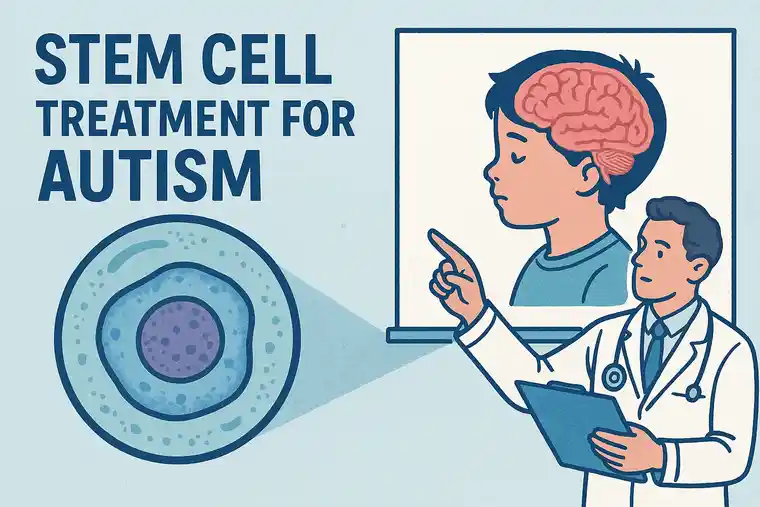A Doctor’s Insight into Hope, Healing, and Science
Autism Spectrum Disorder (ASD) continues to challenge millions of families worldwide. In Turkey, a new beacon of hope is emerging through Stem Cell Therapy for Autism, offering innovative ways to address the underlying biological dysfunctions of ASD—not merely its symptoms.
In this extended, evidence-based guide, Prof. Dr. Serdar Kabataş, neurosurgeon and pioneer in regenerative therapies, provides his clinical perspective on how mesenchymal stem cell (MSC) therapy can help children and adults with autism. Backed by scientific rigor, global research, and compassionate care, this article brings together everything families need to know—from understanding autism’s complex biology to the latest treatment protocols, safety standards, and what to expect from your journey.
Table of Contents
1. What is Autism?
Autism Spectrum Disorder (ASD) is a complex neurodevelopmental condition affecting communication, social interaction, and behavior. Traditionally perceived as a behavioral disorder, modern science reveals that ASD is deeply rooted in biological dysfunctions such as chronic neuroinflammation, immune imbalance, and oxidative stress—factors that significantly impact brain function and connectivity.
While behavioral therapies remain essential, these approaches alone cannot address the biological layers of autism. This is where stem cell therapy, particularly using MSCs, becomes a transformative adjunct.

2. Understanding the Biology Behind Autism and Stem Cell Therapy
Recent studies have clarified that ASD is not solely psychological but a multi-system disorder. Research identifies key abnormalities in individuals with ASD:
- Chronic brain inflammation
- Disrupted immune system responses (elevated cytokines)
- Mitochondrial dysfunction and oxidative stress
- Microglial overactivation leading to neural pruning issues
These insights shift the paradigm toward addressing the biological roots of autism using cellular therapies like MSC therapy, which targets inflammation, immune regulation, and neural support—providing a biologically supportive foundation for developmental gains.
3. What Are Mesenchymal Stem Cells (MSCs), and Why Use Them for Autism?
MSCs are ethically acceptable adult stem cells derived from sources like:
- Umbilical cord (Wharton’s Jelly-derived MSCs – WJ-MSCs)
- Bone marrow
- Adipose (fat) tissue
These cells are favored for their immunomodulatory, anti-inflammatory, and regenerative properties, without the ethical concerns of embryonic stem cells.
4. Key Benefits of MSCs in Autism Treatment
- Immune System Modulation – MSCs help rebalance the immune response by reducing inflammatory cytokines like TNF-alpha, MDC, and TARC.
- Neuroprotection – MSCs release growth factors that stimulate brain repair and synaptic connections.
- Oxidative Stress Reduction – By transferring healthy mitochondria and producing antioxidants, MSCs combat oxidative stress.
- Low Rejection Risk – As immune-privileged cells, MSCs minimize rejection risks.
Wharton’s Jelly MSCs are particularly potent and are the preferred source used in Turkey’s advanced protocols.
5. What Does the Clinical Research Say?
- Duke University Trial (Phase I Safety Trial with WJ-MSCs): No severe adverse events. About 50% showed improvements in speech, eye contact, and social engagement.
- 2022 Meta-Analysis (11 Studies, 461 Children): Marked improvements in irritability, hyperactivity, and social interaction with no serious side effects.
- Ongoing Trials: In India, Iran, Panama, and Turkey, all reporting significant positive outcomes, especially in multi-session protocols.
6. Stem Cell Therapy for Autism in Turkey – The Treatment Protocol (Kabataş Method)
- Comprehensive Medical Screening: Full medical history, neurological assessments, bloodwork, MRI if needed. CARS baseline documentation. Informed consent with family education.
- MSC Processing in GMP Laboratories: Ethically sourced umbilical cords, cultured up to 4 passages, tested for sterility and identity.
- Delivery Methods: Intrathecal (IT) via lumbar puncture (main method), Intravenous (IV) as support, optional Intranasal (IN) or Intramuscular (IM).
- Treatment Frequency: Minimum 3 sessions spaced 6–7 days apart, optionally up to 6 sessions.
- Integration with Conventional Therapies: Ongoing speech, occupational, behavioral therapies alongside stem cell treatment.
- Follow-Up and Evaluation: Post-treatment assessments at 3, 6, 12, and 24 months using neurodevelopmental tools.
7. Who Can Benefit from Stem Cell Therapy?
Ideal candidates include:
- Children aged 3–18 with ASD
- Adults with autism experiencing cognitive, focus, or speech limitations
- Patients without severe organ failure, uncontrolled epilepsy, or active infections
Important Note: Younger patients often exhibit faster and more pronounced improvements due to the brain’s plasticity. However, adults with ASD have also shown remarkable progress, especially in emotional regulation and social interaction.
8. The Patient Journey – What Families Can Expect
- Before Treatment: Warm consultations, transparent explanations, and thorough health screenings.
- During Treatment: Well-tolerated sessions with mild side effects (temporary fever, fatigue).
- Between Sessions: Gradual positive changes—eye contact, new words, improved sleep, calmer behavior.
- After Completion: Long-term gains documented through follow-up evaluations.
9. Therapeutic Goals – What Improvements Can Be Expected?
- Behavioral: Reduced irritability, fewer meltdowns, decreased hyperactivity.
- Communication: New words, clearer speech, improved social interactions.
- Cognitive: Better focus, problem-solving, and engagement.
- Sensory: Improved tolerance to sounds, lights, and textures.
- Quality of Life: Calmer routines, improved sleep, and emotional balance.
10. Safety, Ethics, and Transparent Care in Turkey

- GMP-certified laboratories
- Ethical sourcing of umbilical cord MSCs
- No exaggerated claims
- Strict post-treatment follow-up
Red Flags to Avoid:
- No medical oversight or evaluations
- No post-treatment follow-up
- Vague or unlicensed providers
11. The Future of Stem Cell Therapy for Autism
- Larger, placebo-controlled international trials
- Personalized protocols based on biomarkers
- New combinations with exosomes, hyperbaric oxygen therapy
- Broader access through ethical pricing and insurance models
Final Words from Prof. Dr. Serdar Kabataş, Neurosurgeon & Regenerative Medicine Specialist
Every child deserves the chance to grow, learn, and connect. Stem cell therapy is not magic—it is science, responsibility, and compassion intertwined. As a doctor and researcher, I have witnessed how this approach can help children take meaningful steps toward a better quality of life. It’s not a miracle, but a carefully guided journey where science and care walk hand in hand.
Every new word spoken, every moment of eye contact, every smile, and every hug—these are not small things. They are powerful victories that remind us why we dedicate ourselves to this work. They show us what is possible when hope meets rigorous science and heartfelt care.
To all the families on this journey: you are not alone. We stand with you—hand in hand, heart to heart, working tirelessly to make these therapies safer, stronger, and more accessible for all those who need them.
Detailed version of stem cell treatment for autism by Dr. Serdar Kabataş
Frequently Asked Questions (FAQ)
What is Stem Cell Therapy for Autism in Turkey?
It is an advanced regenerative treatment that uses stem cells—either from the patient or a donor—to support neurological repair and cognitive improvement in children with Autism Spectrum Disorder. Turkey is known for offering high-quality stem cell therapy in internationally accredited clinics.
Is stem cell therapy safe for children with autism?
Yes. When performed in certified medical facilities with proper screening and protocols, the treatment is considered safe. Most side effects are minor and temporary, such as fatigue or mild fever.
What are the expected results of stem cell therapy for autism?
Many families report improvements in attention span, language development, emotional regulation, and social interaction. However, results vary based on the child’s condition, age, and response to therapy.
How long does the stem cell treatment process take in Turkey?
Typically, the full treatment plan takes between 7 to 14 days, including stem cell extraction (if autologous), infusion, observation, and supportive therapies.
Are the stem cells used in Turkey ethically sourced?
Absolutely. Turkish clinics adhere to international ethical standards, using stem cells from thoroughly screened and approved sources, including umbilical cord banks and patient’s own tissue.
What is the cost of stem cell therapy for autism in Turkey?
Costs vary depending on the clinic, treatment type, and patient needs, but in general, Turkey offers significantly lower prices than clinics in Europe or the U.S., making it a cost-effective choice for many families.
Can adults with autism undergo stem cell therapy in Turkey?
Yes, although the most responsive age group is children between 3 and 18 years old, adults may also benefit, depending on their medical condition and diagnosis.
How can I get started with stem cell therapy in Turkey?
The first step is to contact a certified clinic or medical facilitator in Turkey. After providing your child’s medical history and diagnostic reports, a customized treatment plan will be created for evaluation.

